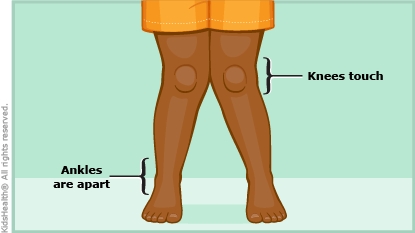Knock Knees (Genu Valgum): How to Care for Your Child
Knock knees — or genu valgum (GEE-noo VAL-gum) — is when a person stands with straight legs and the knees touch but the ankles are apart. Young kids often have knock knees. They are rarely serious and usually go away without treatment by the time a child is 7 or 8 years old.


-
There are no limits on activity. Your child may run, walk, or play sports, just as other kids the same age do.
-
Make any follow-up appointments with your health care provider or an orthopedic specialist as directed.

Your child:
-
has pain, weakness, limping, or trouble running
-
has worsening of knock knees after age 4
-
has knock knees that do not get better by the time the health care provider told you they should

What causes knock knees? Normal bone growth and development when kids are about 2–4 years old can make the knees turn inward.
What can be done for knock knees? Knock knees rarely need treatment. Usually, the legs start to straighten around age 4 and knock knees go away around the time a child is 7 or 8. Children with knock knees need repeat exams by the health care provider to make sure they get better as they grow. Some kids need to see an orthopedic specialist (bone specialist) if the legs don't straighten on their own.
If knock knees are painful or don't improve by around age 10, health care providers might suggest doing surgery to straighten the legs.
Can knock knees be a sign of something more serious? Rarely, if knock knees don't go away or if they start after age 4, it may be a sign of a health problem. For example:
-
A healed fracture in the growth area of one of the bones around the knee can cause the knee to turn inward.
-
Rickets is a bone growth problem caused by lack of vitamin D or calcium. This is much less common today than in the past. It can be treated with vitamin D and calcium supplements.
-
Health problems called dysplasias, which some children are born with, can affect the way bones grow.
-
Being overweight can affect how bones grow.